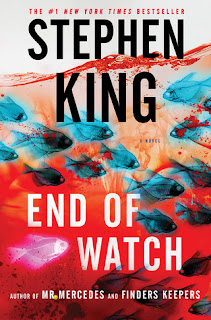End of Watch
"Suicide may not be painless, but it is catching." This line comes near the end of End of Watch, the third and final book of Stephen King's "Hodges Trilogy." These books have been a different sort of King book, as the first two did not contain anything paranormal and were more mystery thrillers than horror. This book, though, could be termed mystery/science fiction, because some things go on that aren't possible, at least not yet.
The first book of the series, Mr. Mercedes, concerned Bill Hodges, a retired detective, catching the killer Brady Hartsfield, a very evil guy. His friend Holly Gibney whacked Hartsfield in the head with a sock full of ball-bearings, preventing him from blowing up a concert hall full of teenagers. Hartsfield was only briefly mentioned in the second book, Finders Keepers, but he's back in End of Watch.
Supposedly, the blow Hartsfield took rendered him nearly comatose. He spends his days in the hospital, brain damaged, and thus not eligible for trial. Hodges visits him to taunt him, suspecting that he's faking it. The nurses notice strange things, such as objects moving on their own. Hartsfield has been receiving experimental drugs from a Dr. Babineau, which may be giving him extra powers.
Meanwhile, people have started killing themselves, including two nurses that cared for Hartsfield, some survivors of his crime in the first book, and teens who were at the concert he failed to blow up. Hodges and Gibney figure out that the connection between the victims is a hand-held game called a Zappit. They face the amazing fact that Hartsfield may be behind these suicides. But how?
As usual with King's books the writing here is just so splendid. I do wonder sometimes at his use of detail. Sometimes the details are completely unnecessary, as discussing a game show contestant. King throws in that he won a trip to Aruba, and I found myself wondering why he added this, as it makes no difference to the story. I wonder if Elmore Leonard would have approved. However, King is a clever man, because a seemingly throwaway gag about his corny ring-tone becomes very important.
This book isn't called End of Watch for nothing. Trilogies are no more than three, and there are unlikely to be any more Hodges books, unless they are prequels. Early in the book Hodges is diagnosed with pancreatic cancer, and if the book had a musical score we'd hear the opening of Chopin's Funeral March. King manages to work the cancer into the suicide theme, mentioning how cancer cells run rampant until their host dies, thus killing themselves. "Maybe it’s self-hating, born with a desire not to murder the host but to kill itself. Which makes cancer the real suicide prince."
The first book of the series, Mr. Mercedes, concerned Bill Hodges, a retired detective, catching the killer Brady Hartsfield, a very evil guy. His friend Holly Gibney whacked Hartsfield in the head with a sock full of ball-bearings, preventing him from blowing up a concert hall full of teenagers. Hartsfield was only briefly mentioned in the second book, Finders Keepers, but he's back in End of Watch.
Supposedly, the blow Hartsfield took rendered him nearly comatose. He spends his days in the hospital, brain damaged, and thus not eligible for trial. Hodges visits him to taunt him, suspecting that he's faking it. The nurses notice strange things, such as objects moving on their own. Hartsfield has been receiving experimental drugs from a Dr. Babineau, which may be giving him extra powers.
Meanwhile, people have started killing themselves, including two nurses that cared for Hartsfield, some survivors of his crime in the first book, and teens who were at the concert he failed to blow up. Hodges and Gibney figure out that the connection between the victims is a hand-held game called a Zappit. They face the amazing fact that Hartsfield may be behind these suicides. But how?
As usual with King's books the writing here is just so splendid. I do wonder sometimes at his use of detail. Sometimes the details are completely unnecessary, as discussing a game show contestant. King throws in that he won a trip to Aruba, and I found myself wondering why he added this, as it makes no difference to the story. I wonder if Elmore Leonard would have approved. However, King is a clever man, because a seemingly throwaway gag about his corny ring-tone becomes very important.
This book isn't called End of Watch for nothing. Trilogies are no more than three, and there are unlikely to be any more Hodges books, unless they are prequels. Early in the book Hodges is diagnosed with pancreatic cancer, and if the book had a musical score we'd hear the opening of Chopin's Funeral March. King manages to work the cancer into the suicide theme, mentioning how cancer cells run rampant until their host dies, thus killing themselves. "Maybe it’s self-hating, born with a desire not to murder the host but to kill itself. Which makes cancer the real suicide prince."


Comments
Post a Comment